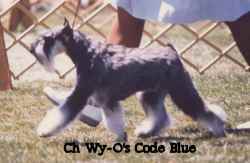
WYOMA'S
HINTS ON PUPPY CARE . . . . . . . . . . . . 
DIET : . Our puppies are weaned to dry dog foods that we add grind, then add a special puppy milk when they are tiny, but by 8 - 10 weeks, we just add warm water. We feed an eight week puppy about 1/4 cup, moistened with warm water, three times per day, gradually increasing as the puppy grows. We switch to twice a day at about 5 - 6 months for breakfast, and about 1/3 to 1/2 cup for dinner -adjust for weight control. And we give small snacks during the day - read the section below about enthusiastic crate training. We have been trying some different foods - settling for now on Fromm - Chicken a la Veg. - first ingredients Chicken, Chicken Meal, Pearled Barley, Oatmeal, Sweet Potatoes, Brown Rice, etc. We've also fed them Blue Buffalo, Life Stages, Chicken & Brown Rice, - first ingredients: Deboned Chicken, Chicken Meal, Whole Ground Brown Rice, Whole Ground Barley. Our dogs have also eaten "Fromm Gold Label" or "Chicken Soup for a Dog Lover's Soul". We have rotated foods which provides dogs with a broader variety of vitamins and nutrients. Some kibble foods labeled "balanced" might still not contain some beneficial vitamins and nutrients, so rotating between them helps ensure your dog gets everything he needs. An excellent resource is http://www.dogfoodanalysis.com/
Through the internet, I've been asked about "itchy" dogs - to the best of my understanding, wheat and corn are likely diet suspects, sometimes even the meat source chicken or beef or lamb - talk to your veterinarian. Some foods which avoid wheat, corn, and soy are "Blue Buffalo", "Fromm", or "Chicken Soup for the Dog Lover's Soul" or "Eagle Pack" www.eaglepack.com or "Flint River" 909-682-5048. You will have to research and experiment.
Our boy "Tate" was our poster-child for the differences even in so called 'premium' dog foods. When "Tate" was about 9 yrs old, he started looking old, a little boney. His coat was dry like straw, but he seemed to get gummy/dirty in no time at all after a bath. After we changed from Solid Gold Hundeflocken to Flint River, we noticed that his coat became shiny, color returned he just felt healthier, stayed clean, and his body & muscles seemed to fill back in. When we switched to the “Chicken Soup……” food, he continued to thrive, and lived to almost 15 years old.Because some Miniature Schnauzers can have easily upset stomachs, do not give your puppy or adult any table scraps, or anything rich, spicy, or greasy. A healthy Min Schnauzer has an excellent appetite, so they will be happy with treats of extra pieces of dog food as well as a dog cookie. A little fruit & vegetable added to their food, or as a treat are fine - raw carrot, or a bite of apple are fine. Overfeeding your puppy can cause loose stools, even diarrhea, not to mention a fat puppy. If your Miniature Schnauzer gets into something and develops a little diarrhea or vomits, give him a tsp. of Pepto Bismol or Kaopectate, withhold food for 12 hours, and then feed a bland diet like a little applesauce, or rice with chicken meat for a day or two. If the diarrhea continues, or is nasty looking or foul smelling, see your veterinarian right away. Blood in stool or vomit, or repeated vomiting is medical emergency - get help immediately.
TOYS:
Nylabone, Gummabone,
some fuzzy toys are fine, or hard rubber but don't allow soft rubber toys
that can
be torn and swallowed. Our dogs also like those white 'shank' bones, sometimes
called 'sterilized bone'. Some Miniature Schnauzers will eat (and
swallow) rawhides, which is dangerous at the worst, and messy at the least.
TEETH:
Watch
your puppy's mouth to make sure his baby teeth are falling out properly
as his adult
ones come in. Sometimes, the large canines (in the four corners) need to
be pulled so they won't misplace adult teeth. Be sure to ask that any
remaining baby teeth be pulled when he is under anesthesia for spaying or neutering.
You should brush the adult teeth with a soft, child size tooth brush,
and
a non-foamy
toothpaste.
If tartar builds up, it produces excess bacteria that can cause permanent
heart and liver damage, so have your veterinarian clean your dog's teeth
as needed.
GROOMING: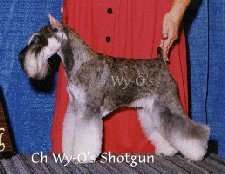
A
Miniature Schnauzer needs to be brushed well once or twice a week
to prevent matting - more
often if they wear a sweater in the winter, and watch the armpit area for
mats. Use soft slicker brushes, such as a Miller-Forge Doggy Man slicker
brush, or Lambert-Kay EverGentle slicker brush to line brush inch by inch
up the legs and back down again. Gently but firmly insist the puppy hold
still, perhaps upside down on your lap, with no struggling, no chewing
on your fingers
or the brush. Then comb through with a metal dog comb to make sure all
the mats are out. Bathe with a good shampoo - one that really cleans the
skin rather than one that talks about conditioning hair - I
tend
to
like "Fresh & Clean
Snowy Coat". If you buy a gallon, it is concentrated. Dilute
it with water, and the gallon will last you for years. Surprisingly, you
can also use Dawn Dish Soap - it's what animal rescuers use in case of
oil spills.... Rinse very well, of course,
and towel
dry. Brush
upwards with the slicker brush
as
you
blow
dry
to
make
the
furnishings fluffy. Your pet puppy needs to be clippered about every 2
months; show
puppies' coats are treated differently. Remember, the longer the coat grows,
the more it tends to mat. Your Miniature Schnauzer will be much prettier
and easier to care for if you keep him clean and neat.
HOUSE
TRAINING:
I found this important
training tip elsewhere on the web - "A rolled up newspaper can be an effective
training tool when used properly. For instance, use the rolled up newspaper
if your dog chews something or has a housebreaking accident. Take the rolled
up newspaper and hit yourself over the head as you repeat the phrase, "I
FORGOT TO WATCH MY DOG, I FORGOT TO WATCH MY DOG." If your dog laughs at
you when you do this,, praise him."
A
medium size, heavy plastic airline crate is an excellent investment for about
$40 at WalMart or the
big 'box'
stores or online. Use it for house training, preventing chewing during teething,
for
traveling,
and as your
dog's bed in your home. We use a double thickness of artificial wool fleece
type fabric and a "Snuggle Bed" (all wash & dry) to make a comfy pad. Far
from viewing the crate as punishment, he will probably use it for an occasional
quiet nap. 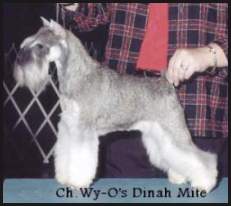
Let your puppy sleep
in his crate at night and whenever you are gone. Giving him a dog cookie
or several pieces of dry dog food as you put him in will keep his enthusiasm
up too! Your young puppy needs to go outside every time he wakes up, right
after eating, and frequently while playing (every 15 minutes or as soon
as his attention wanders, or his eyes glaze as he heads for the corner
- Outside!)
Stay with him to
make sure he goes and praise correct behavior. Unless you catch him goofing,
he won't understand punishment - rubbing his nose in anything is barbaric,
messy, and solves nothing. Clean any mistakes with a white vinegar and
water solution or an enzyme deodorizer so the spot doesn't smell 'good'
next time. An accident usually means the puppy was given too much freedom
before he was ready. (remember the newspaper - it's for you - not the dog!!!)
A more detailed
article on housebreaking can be found at house
training your dog
There are several
pet supply companies with online catalogs -- check their prices for crates,
shampoos, toys, brushes & combs, clippers, and so on .... We've ordered
from them all, at one time or another, with good results.
| KV Vet Supply | PetEdge | Cherrybrook |
LEARNING:
Puppies learn fastest
and most between the ages of 3 and 16 weeks, so try to introduce him to
different experiences and new people, or children, during that time. Dan
Kiedrowski, author of The New Miniature Schnauzer, Howell Book House 1996,
describes how the Miniature Schnauzer seems to think in a much more human
way than most other dogs. He also writes that the learning capacity of
the Miniature Schnauzer is proverbial, and limited only by the patience
of the teacher...The only requirements are firmness, repetition, patience,
and above all, kindness.
Dan
Kiedrowski's 2nd edition (1996) of "The New Miniature Schnauzer"
Anna
K Nicholas' "The Book of the Miniature Schnauzer"
I'm afraid both those books
are out of print, but you can find them in used book stores online, including
through the Amazon website.
Dan's new
book is "From Ruffy to Rep" -- it's a big book, over 400
pages, 800+ photos, $60, available from Schnauzer Shorts, PO Drawer A,
LaHonda, CA 94020. (We're on pages 242 - 245 ![]() )
)
CUDDLE,
BUT DON'T CODDLE!!!
In general, reward
your dog's positive interactions with her world, rather than reinforcing
poor behavior by babying her. For example, if your puppy barks more than
a couple of barks, sternly tell her No! No Barking! and if needed, hold
her muzzle together for a couple of seconds. Or if your dog is out
in the yard barking, call her inside without scolding when she comes -
you don't want to punish her for coming to you! Puppies like
to chew on everything, including you, but their baby teeth are like razor
blades. Tap on her nose and say No! or Ouch! to let her know she has gone
too far.
If she acts afraid
of some new situation (as long as it isn't dangerous) gently but firmly
insist that the puppy tolerate or investigate whatever 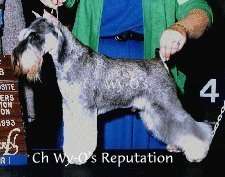 it is, and then reward her with a little attention while she is behaving
appropriately. In either case, the worst thing to do is to pick her up,
pet her, and try to sweet talk her in to or out of something. The dog interprets
your reassurance as approval, so you are reinforcing the bad behavior you
meant to discourage. Be very matter of fact - there are plenty of other
times to pet and play. If real discipline is necessary, a truly firm tone
of voice is usually enough.
it is, and then reward her with a little attention while she is behaving
appropriately. In either case, the worst thing to do is to pick her up,
pet her, and try to sweet talk her in to or out of something. The dog interprets
your reassurance as approval, so you are reinforcing the bad behavior you
meant to discourage. Be very matter of fact - there are plenty of other
times to pet and play. If real discipline is necessary, a truly firm tone
of voice is usually enough.
SPAYING
/NEUTERING:
Your Miniature Schnauzer
puppy can be spayed or neutered by 6 months of age, or up to a year of age.
This will not make them fat or lazy - eating too much food, too many calories,
without enough exercise is what makes any of us overweight. However, extreme
early spay/neuter, like 8 - 16wks is not a good idea for a dog's long term growth
and
health.
Before you consider
breeding your dog when it is grown - try looking through some of the material
here -- click on: http://www.akc.org/breeders/resp_breeding/Articles/breeder.cfm.
By the way, male
and female Miniature Schnauzers make equally nice family pets; pick a good
temperament in the first place, house train them and then spay/neuter --
male or female is not important in choosing a companion in this breed.
EAR
CROPPING IS OPTIONAL:
Personal preference
is the only reason to have your Miniature Schnauzer puppy's ears cropped,
and it takes a commitment of time and money. My understanding is that cropping
ears and docking tails began as a way to protect our dear Schnauzers from
being shredded by rats and such. (Schnauzers still make good varmint catchers
if we let them)
Left natural, your
puppy's ears should fold over about in the middle, with the crease slightly
above the top of his head. He'll look cute, a lot like "Tramp"of "Lady
and the Tramp", with ears that flop when he runs. If you like the sharper,
cropped expression, please ask your breeder for a referral. A bad
ear crop looks bad forever, and however cheap, is a waste of money. My
own veterinarian does an excellent job, and is the only one I will let
do my puppies. He waits until about 11 - 12 weeks of age, feeling they
tolerate anesthesia better then.
MISCELLANEOUS:
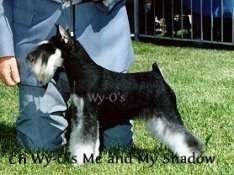
. . . Pick up a puppy
with one hand under his chest, the other under his rump. Never pick up
a puppy by the scruff of his neck or by his front legs. Small children
should sit on the floor to hold a puppy, and then only with adult supervision.
Puppies remember even accidental hurts for a long time.
. . . Use only a regular,
nonslip leather or nylon collar. Slip, or nylon 'choke' collars are useful
for walks, but must not be left on. We've heard horror stories about dogs
accidentally strangling. Harnesses encourage a dog to pull and tug rather
than learning to walk nicely with you.
Try
to find a good obedience trainer, one who uses positive motivational type methods
and
has studied
current canine learning behavior. Well run puppy kindergarten classes,
or beginning obedience classes can be very helpful. Avoid 'jerk and scold'
teachers. Ask your breeder for referrals. Here in Boise, we thought the Puppy
Kindergarten & Novice classes
at the K-9
Education Center 208-362-9272 were very good.
Never leave your
dog alone in the car. Heat affects dogs much faster than humans, and heatstroke
can occur very quickly during the summer, - I hear it's a grim way to die.
Classy looking dogs like a Miniature Schnauzer can be tempting to steal
from cars. Even in your yard, he should be checked frequently, and never
be left out alone when you are gone. Letting a dog run the neighborhood
is a hanging offense in my book.
MEDICAL RECORDS:
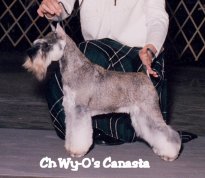 . On
file with my veterinarian. A puppy may not have full
immunity until after the four month shots, so be especially careful about
contact with stray dogs, or even going where strange dogs have been -
like the park or a "doggy park"!! Booster shots are due on the
first
birthday,
and
thereafter,
according to your veterinarian's recommendation. New guidelines have
lengthened the re-vaccination schedule.
. On
file with my veterinarian. A puppy may not have full
immunity until after the four month shots, so be especially careful about
contact with stray dogs, or even going where strange dogs have been -
like the park or a "doggy park"!! Booster shots are due on the
first
birthday,
and
thereafter,
according to your veterinarian's recommendation. New guidelines have
lengthened the re-vaccination schedule.
On to Show
Dogs, Dog Shows . . or . . LINKS . .
. . . . or back to . . Wy-O's
Front Page
Email us -- clouss (at) wy-os.net
©Copyright 1997 - 2013 Wyoma Clouss: All rights reserved for photos, background, and written material. You may not copy or reuse any material on these pages without my express written permission.